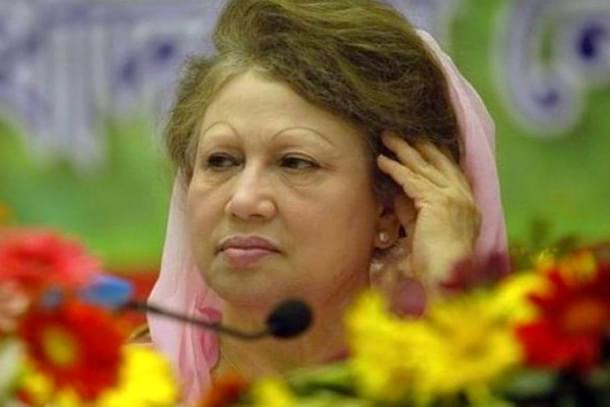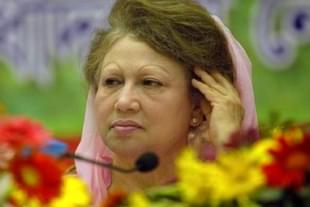World
Bangladesh: How Long Before The BNP-Islamists Take Over?
Ujjwal Shrotryia
Aug 06, 2024, 05:52 PM | Updated 05:52 PM IST
Save & read from anywhere!
Bookmark stories for easy access on any device or the Swarajya app.


A lot has happened in Bangladesh in the last 24 hours.
Four-time prime minister of Bangladesh and the daughter of the Father of the Nation, Sheikh Mujibur Rahman, Sheikh Hasina, was forced to resign and leave her country.
Hasina and her sister Sheikh Rehana escaped in haste to India and landed at an Indian Air Force base in Ghaziabad, just 25 kilometres from Delhi.
Army Chief General Waker-Uz-Zaman has said that an interim government will be formed to run the country.
Just an hour after Hasina left, her house, Gono Bhaban, was surrounded and ransacked by thousands of protesters — students, functionaries of the principal opposition party Bangladesh Nationalist Party (BNP), and Islamists from the hardline party Jamaat-e-Islami (JI) Bangladesh.
There are unconfirmed reports of arson, violence and attacks on minorities, including Hindus, Christians and Buddhists, in the country.
The peaceful protest that started against reservations in government jobs turned violent, finally evolving into a one-point agenda: the removal of Hasina.
Awami League, Hasina's party, has been all but decimated, with most of its leaders and workers either killed, in hiding or fleeing to India to save their lives.
With this, the 15-year rule of forward-looking, relatively secular governance and economic growth and prosperity has ended in Bangladesh.
For now, Bangladesh Army Chief General Waker-Uz-Zaman is the de-facto leader, and he has allayed concerns and said that an interim government will be formed.
However, the larger question now is what for Bangladesh and for India, and how soon before the Jamaat-BNP Islamist combine takes over the entire country?
The Islamist organisation, Jamaat-e-Islami, which gave heft and fuel to the violent protest, until now was banned by its Supreme Court as it was deemed unfit for politics due to its hardline Islamist mindset — which bats for the implementation of medieval Sharia law in the country — is now back.
Jamaat's ties with Pakistan's intelligence agency, Inter-Services Intelligence (ISI), are no secret as well, which unfortunately for India, gives Pakistan a backdoor entry to India's eastern flank.
BNP, the principal opposition party, led by Khaleda Zia (who was in jail until yesterday) is the only remaining political force in the country.
The last time BNP was in power in Bangladesh, from 2001 to 2006, relations between India and Bangladesh nosedived. The primary reason for this was the extensive support given by the BNP to the militants of northeast India and to pro-Pakistani Islamists.
BNP has shown their anti-India inclinations several times in the past.
Although they have tried to change this perception by asking for talks with India, these efforts have been unsuccessful. (To know more read here.)
In fact, just after Hasina won the election in January this year, Tarique Rahman, son of Khaleda Zia and acting chief of BNP (who is also in exile for trying to kill Hasina in a bomb attack in 2004), started an 'India-out' campaign reminiscent of similar campaigns in Maldives and Nepal.
Rahman is said to be in bed with hardline Islamist organisations like Jamaat and others.
It is likely that Rahman or his mother, with the backing of the Jamaat, will try to usurp power in the country in the not too distant future. BNP has already started calling the shots. Hours after Hasina left, Khaleda Zia was released from prison after six years. Rahman is also expected to return to Bangladesh from London anytime now.
BNP secretary general Mirza Fakhrul Islam Alamgir announced that those who were jailed for allegedly political reasons will be released.
The fate seems largely determined now that the BNP-Jamaat alliance appears to be the dominant power centre in the country following the Awami League's decimation.
With Hasina having served three consecutive terms as Prime Minister, these two influential political forces were sidelined for a long time. The current vacuum left by Hasina's removal presents an ideal opportunity for them to reclaim power.
While Army Chief Waker-Uz-Zaman has so far kept his cards close to his chest, questions remain about how much influence he can exert over the outcome of the political crisis in the country.
Although the students involved in the protests have stated that they would not accept a "government of fascists", the interim government set to take charge of Bangladesh within the next 24 to 48 hours is likely to include members from the BNP and Jamaat.
Such an arrangement would provide the BNP-Jamaat with a perfect opportunity to strengthen their position and potentially reclaim power in the new political landscape.
Needless to say, India will have to deal with a new and potentially hostile and increasingly Islamist Bangladesh. India may also have to combat an influx of refugees, both religiously persecuted (Hindus, Christians, and Buddhists) and economic, since the state of Bangladesh's economy sank after the twin shocks of the Covid-19 pandemic and the Russia-Ukraine war.
Bangladesh even had to go to the International Monetary Fund for a bailout package.
With this, the economic situation will only go from bad to worse.
All in all, for India, the road is full of thorns in the near to mid-future, where Chinese and Pakistani forces will hold most of the cards. It will require some deft handling on the part of Foreign Minister S Jaishankar and National Security Advisor Ajit Doval to navigate this minefield.
Staff Writer at Swarajya. Writes on Indian Military and Defence.





